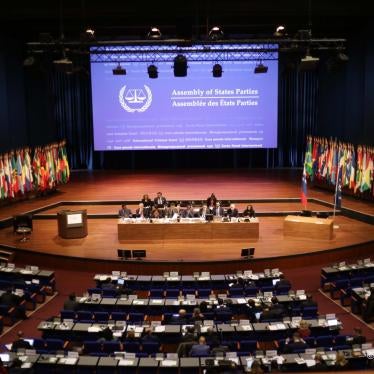Twenty years after the International Criminal Court’s (ICC) creation, this session of the Assembly of States Parties takes place at a moment of renewed attention to the critical role of the court. The expansion of the conflict in Ukraine in February 2022 led to the activation of several mechanisms, including an ICC investigation, that could contribute to delivering justice for victims of serious international crimes.
The horrific situation in Ukraine offers opportunities as well as challenges for the court and the international justice project more broadly. The referral to the ICC has generated unprecedented support for accountability for grave international crimes and put into sharp focus the relevance of the ICC as the keystone of the broad system for justice envisioned by the Rome Statute. And yet the political will for justice in Ukraine has highlighted disturbing double standards in victims’ access to justice elsewhere where serious international crimes are at issue. More progress is needed—in support to the ICC, in universal ratification of the Rome Statute, in criminalizing and prosecuting grave crimes nationally, and in erasing double standards, including before the UN Security Council—to realize a global system of justice that serves the aspiration of the ICC’s founders to “put an end to impunity.”
To meet this moment in the context of the ICC, Human Rights Watch calls on the Assembly through its decision making this week and its commitment year-round to strengthen support for the court to carry out its mandate effectively and consistently across all the situations that come within its jurisdiction. The renewed political commitment to the ICC that has derived from the interest by a substantial number of states parties in addressing the expanded conflict in Ukraine needs to translate into robust financial, political, and practical support for the court’s global mandate.
We look to you, at this Assembly session, to act in four key areas.
First, states parties should send the strongest possible political signal of support for the ICC and the right of victims to access justice by adopting a budget that ensures all of the court’s organs can robustly and consistently execute their work across all situations and meet the rights of defendants to family visits.
For too long, an arbitrary close-to-zero nominal growth approach has deprived the court of the resources it needs to more robustly discharge its mandate. The resort this year to voluntary contributions effectively acknowledged the mismatch between the court’s workload and available resources. The use of voluntary contributions should remain exceptional; the court’s regularly assessed budget, and, as needed, use of the contingency and working capital funds, provides the best protection for the independent, robust implementation of the court’s global mandate. This year, with the Independent Expert Review process significantly advanced, state party discussions should move away from a race to simply hold down growth in an arbitrary manner to an insistence on longer-term planning and sustainability through the court’s regularly assessed budget.
Beyond adopting this year’s budget, states parties should look ahead to the 2023 stakeholder conference on the occasion of the 25th anniversary; the conference should lay the groundwork for realization in the longer term of Independent Expert Recommendation 363–the development of a ten-year strategic vision for the court to support long-term financial investment.
Second, ensuring the highest quality leadership at the court and within the Assembly is essential to the ICC’s success. This includes vetting processes to assess candidates’ “high moral character.” At this session, the Assembly should mandate the development of a vetting process for next year’s judicial elections, as a further step in building on the previous two ad hoc processes toward the establishment of a permanent process for all ICC elections by the next Assembly session.
Third, as the Independent Expert Review assessment phase seemingly nears “completion,” it is crucial to remember the ultimate goal of the review process: bringing about changes needed to strengthen the court’s performance and its effective delivery of justice. While the Review Mechanism’s mandate should not last indefinitely and will come to a formal end point, the implementation of the recommendations will continue, likely for several years. Efforts to improve the court’s performance should remain part of the court’s regular work.
At this session, states parties should adopt a limited renewal of the Mechanism’s mandate to finish any outstanding assessments of recommendations. The Mechanism should also provide guidance on the ongoing implementation phase, guided by key principles including rigorous respect for the court’s independence while ensuring accountability to the Assembly; ensuring adequate resources to support implementation of positively assessed recommendations; facilitating inclusive participation of civil society; and a key focus within the Assembly on recommendations addressed to states parties.
Fourth, the Rome Statute system is animated by the human rights defenders, victims, and survivors seeking justice through its pathways, including this court. These activists on the frontlines of justice often face reprisal and retaliation from those who fear accountability. We welcome the adoption of a strategy to defend the court and those cooperating with it from threats and attacks, consistent with Independent Expert Review Recommendation 169. We call on you to use this strategy now, including by condemning as the Assembly, Israel’s designation of six prominent Palestinian human rights organizations, including those that have campaigned for an ICC investigation in Palestine. We look to you, the Assembly and as individual governments, to stand up for justice by standing with human rights defenders.







